The synth-pop trio join Document to discuss their enduring inspirations, courting chaos, and their new album, ‘Strange Disciple’
Nation of Language have been busy. On the day we meet for drinks at Brooklyn meadery Honey’s, the band has already shot a music video; they’re recovering from a headlining indieplaza at Rockefeller Center, a first-time Fashion Week performance at Ulla Johnson’s runway show, and are preparing to leave town the next morning for an international tour. “Usually, you dread a red-eye flight,” says Ian Devaney, the band’s frontman and primary songwriter. “But this time, I’m like, Man, I can’t wait to lie down!”
Even amidst all this, Nation of Language—which consists of Devaney, “synth princess” Aidan Noell, and bassist Alex MacKay—have made time for one of their most cherished monthly rituals: “Cinema Du John,” a film series curated by a friend and MacKay’s brother in the back room of their favorite neighborhood bar. Before diving into their latest album Strange Disciple, they invited me to join them for a night of Charlie Chaplin shorts (One A.M.), a Jackie Chan film (Police Story), and some much-needed decompression (a personal send-off organized by family and friends, many of whom could be seen sporting Nation of Language merch).
When I arrived at the bar, Devaney was in front with his shirt pulled over his head, attempting to escape the heat; the band had just completed another interview in a taxi with no AC, rolling the windows up so they could be heard over the sound of Midtown traffic. We headed to the roof, where I met Alex and his dog, Claudia (canonically gorgeous, incredibly sweet); Aidan and I bonded over being slut-shamed anywhere above 34th Street. We embarked on a mission to snap some photos on a nearby metal bridge, swiftly exiting as we heard a crack of thunder in the distance. Then, as the rain started to pour, we took refuge in a cozy booth to discuss their latest record, Strange Disciple.
Camille Sojit Pejcha: I had a dream last night that I forgot to record the interview. So this is me, pressing the record button.
Aidan Noell: I’ve been having a lot of crazy dreams, too—I think it’s all the stress of the last few weeks, not getting a full REM cycle.
Camille: What are your work-related stress dreams like?
Aidan: Going to the show and having no cables. Or showing up, and all the presets on my synth are wrong. And it actually happened the other day when we played a show at Rockefeller Center. It started raining, so they had to un-patch all the cables, and they re-patched them all mixed up, so we ended up having to do a second soundcheck. I was definitely not on my best behavior—my attitude was highly cranky.
Noell hasn’t always been having synth-related stress dreams—in fact, she only started playing music in 2016, when Devaney’s former bandmate moved away and he found himself in sudden need of a collaborator. “I offered myself up to learn,” she recalled in our first interview earlier this year. “And from the first show I got to play with the band, it was an addictive thing… You can’t give that up once you have experienced it.”
Before Nation of Language, Devaney was performing with other bands like the Static Jacks and Machinegum. It’s how he met Noell, an audience-member who found herself enamored by his stage presence, and introduced herself after a show. The pair started dating when Noell moved to New York, and married a few years later—asking their friends not for donations toward a honeymoon or wedding registry, but to help fund their band.
As romantic and creative partners, they support one another both on tour and at home—stepping in to take over when the other gets too stressed, like the other night at Rockefeller. “It’s one of those things where if you see your bandmate going through shit, it flips a switch in your mind where you’re like, I have to be there for them.” she recalls. “That day, I think I just reached my limit, and I was the one in the bad place. But Ian walked off stage and was like, I had fun. And I was like, As long as somebody had a good time, then I’m down!
Camille: Tell me about the process behind Strange Disciple, and how it differs from your previous albums.
Ian Devaney: Each album felt like it was made in such different circumstances. Our first record, Introduction, Presence, was made between shifts at the café, or the restaurant, or Aiden’s nannying gig. Then COVID happened. We made A Way Forward in lockdown, which is a unique experience because you have no idea when the world is going to open back up again, so you don’t feel any pressure to rush anything.
The process for Strange Disciple was very curatorial, because many of the songs were written over a long period of time. My process is very free-flowing, rather than trying to force things into a box. So if I’m writing a song and it feels like it’d be a great country song, I’ll just write a country song, and maybe we’ll have a country album one day. It’s all about letting your creative spirit see itself forward.
“When you’re writing a song, the sounds of certain syllables just feel right. You’re chasing a feeling, and that’s what distinguishes poetry from prose.”
In Strange Disciple, the band hones in on themes of obsession and infatuation—evoking the cycle of growth, repetition, regression, and catharsis over the course of 10 tracks. “We wanted to explore how those feelings twist your brain around,” Devaney says. “The highs and the lows, and the sort of addiction to that swing that you can experience around desire.”
The album opens with “Weak In Your Light,” a love song defined by Devaney’s yearning vocals, set over a bouncy, minimalist synth beat. “Sole Obsession,” the album’s spiritual title track and lead single, is similarly danceable—but beneath the hypnotic groove lurks an undercurrent of romantic angst: “Too far along to operate / Don’t offer me this measured attention / End the cycle,” Devaney urges, voice rife with conflict. This sort of inner battle, and its aftermath, animate many of the songs: “I give up, I give in / Signing off, it’s tired and repetitive,” Devaney sings in “Surely I Can’t Wait,” while “Swimming In The Shallow Sea”—a hazy, atmospheric track that borders on shoegaze—sees him reckon with the fallout: “I watch you floating out of reach.”
This sense of romantic yearning is equally evident in tracks like “Spare Me The Decision,” with its soaring, siren-like synths complementing Devaney’s evocative delivery. “Sightseer,” too, provokes a familiar ache: “Maybe I’ll have to feel this on my own,” Devaney sings, seemingly on the cusp of accepting an impending heartbreak, before resignation turns to desperation: “Did I call too late tonight? / All I do is work anymore / Bet I could fix up my face between 8th and 9th / And I could be what you want.”
Camille: A lot of your songs address this roller coaster of emotion in a romantic context, whereas ‘Too Much, Enough’ speaks to the frustrations of modern life: the anxiety of doomscrolling, the feeling of being bombarded by the modern news cycle. How do you navigate these feelings as you go between life on tour and re-entry into the normal world?
Aidan: On tour, every day you wake up and there’s a to-do list; you need to focus on getting where you need to go, making sure everything sounds good, playing the show, and getting to bed. It’s honestly an extreme distraction from how shitty the world is.
Alex MacKay: But then, when we get back from tour, there are often a host of existential questions that need tending to. Because you’ve been so consumed with what’s right in front of you, suddenly you return, take a step back, and realize all the things you haven’t been thinking about at all.
Ian: It’s such whiplash, going back to real life, because the roller coaster still has the lows, but the highs aren’t quite as high. When you’re on stage and all those people are cheering for you, there’s this endorphin rush—and then you get off stage and you’re just by yourself, and there’s this huge crash.
Aidan: I remember expressing these feelings to my therapist, because at the time I was really struggling with panic attacks. And she was like, the things in your brain that make you a creative person are the same things that make your fight or flight reflexes so volatile, the same things that can make you depressed. Would you rather not be creative? Would you rather be a different kind of person? If you genuinely reflect on that, then you would probably say no.
And that’s the same thing Ian says in terms of this album—experiencing these high-highs and low lows can be very difficult, and very heartbreaking at times. But there’s so much beauty in being alive and being able to feel things, and you should be grateful.
Alex: Creativity requires a certain amount of chaos and entropy—an energized chaos. I feel like I’m always trying to introduce aspects of entropy into my process because that’s where you find things that surprise you. But entropy in the brain correlates to anxiety. It can be very challenging—you’re trying to live a creative life and channel the chaos in productive ways, while also keeping it from scrambling everything. It feels like you’re dancing with it sometimes.
Camille: How do you go about channeling these feelings into the music—are you pulling largely from biographical experience when you write, or is your approach more abstract?
Ian: Sometimes it will be about something happening in my life, or a friend’s life, but often I’ll use that as a jumping-off point. Writing a song is a little like making a movie in the sense that my goal isn’t to tell a story exactly how it happened. It’s to capture the emotion behind it.
Alex: When you’re writing a song, the sounds of certain syllables just feel right. It’s intuitive, so it’s better to follow that process than try to change the lyrics to be more topical. You’re chasing a feeling, and that’s what distinguishes poetry from prose; you’re trying to evoke something, rather than explain something.
“As a person, I’ve never been perfect at anything, and I haven’t wanted my music to be.”
This evocative quality is, perhaps, why half of the band’s audience can be found dancing; the other half, crying. I’ve only ever danced at Nation of Language’s shows—a hard impulse to resist, once you’ve witnessed Devaney’s kinetic movement onstage—but I’ve seen the level of sheer emotion their music provokes.
Part of the band’s appeal is their ability to conjure up a feeling or moment in time—one that, for older generations of fans, invokes the music of their youth, with nods to New Order, Orchestral Manoeuvres in the Dark, Depeche Mode, and Kraftwerk. Yet as much as Nation of Language embodies the sonic influences of the ’80s, they also bring something new to the table: a modern sensibility and rule-breaking approach that imbues their sound with the ineffable, contagious quality of live performance.
This element is all the more evident in Strange Disciple, which was created using analog synths, forcing the band to embrace the imperfections of each performance. The album was produced by the band’s longtime collaborator Nick Millhiser in his Williamsburg studio, where the tracks were printed to tape. “I don’t think I sang any of the songs more than three or four times,” Devaney says, describing how—due to their choice of equipment—it’s impossible to rework elements of a song without rebuilding it completely. This acceptance of the limits and surprises of live performance was intentional: “It’s all about not being too precious with every little detail. Instead, we’re thinking about the impact each song is supposed to achieve,” Devaney says. “I think, for a modern synthesizer record, it can feel fairly rough-hewn at times. And that reflects how I feel—that I’m just scraping by and doing the best I can. As a person, I’ve never been perfect at anything, and I haven’t wanted my music to be.”
Camille: When you’re working in this way, how do you know when a song is done?
Ian: You have to ask yourself, Does it make you feel the way it’s supposed to make you feel? If the answer is yes, then let’s go; let’s start the next one.
Aidan: His mantra over and over again during the recording process was, ‘Don’t let perfect be the enemy of the good.’ It’s like, maybe this pitch is a little off, or maybe you hit that note like a fraction late—but that makes it a genuine article.
Alex: If you look back on the music you’re inspired by, you come to understand that so many of the songs you love are not technically correct! You’ll listen to something and be like, Whoa, maybe Gaga’s vocals are super dry—but that’s actually compelling. You work so hard to balance a mix, and then the real artistry of it is in unbalancing it—pushing some things way up and way down and being like, How does that make me feel?
Ian: It’s not about ‘does it sound right.’ It’s ‘does that feel right?’
Alex: Or even, Does it make me feel weird in a way that I like? There are albums or songs by some of my favorite artists that they’ve released and later disowned, because they just can’t stand it—but those are my favorite tracks. I think it’s probably because it’s so vulnerable and so unadorned that they feel exposed listening to it.
Ian: There are certain New Order songs that sound atrocious, but they’re so good. And if they had tried to perfect it, then I probably wouldn’t love it as much.
Alex: I think it’s the same mistake you can make when you listen to a recording you made with a band, and you think your own instrument sounds like shit—but people are going to be listening to the whole thing at the same time, and that’s what you should be paying attention to. I think people want to hear something they’ve never heard before, but even more than that, they want to feel something in a new way.
For Devaney, the inspiration to form Nation of Language struck when he least expected it: sitting in his father’s car when “Electricity” by Orchestral Manoeuvres in the Dark came on the radio. It’s a song emblematic of the ’80s—one he had heard often growing up. “It immediately transported me back to being a very small child, and set off all these alarms in my head in the best way,” he told the Irish Independent. Flooded with nostalgia and a desire to evoke the same flush of emotions with his music, he decided to change his sonic direction—pivoting from the punk sensibilities of the Static Jacks to the direct, synth-driven sound that would become Nation of Language’s calling card.
After Devaney recruited Noell and former Static Jacks bandmate Michael Sue-Poi—their then-bassist—to join the project, everything changed, fast. The Static Jacks had lapsed into inactivity, and from the ashes, Nation of Language seemed to spring fully-formed: Their first album, Introduction, Presence, received glowing reviews, and a dedicated fanbase soon followed.
The through-line between Nation of Language and Devaney’s prior projects was the simplicity: He gravitates toward songs that grab the listener, inducing a sense of immediacy through sparse, often imperfect instrumentation. With Strange Disciple, the band wanted to create an album where each track serves a specific sonic and emotional purpose, while simultaneously serving to illustrate the album’s theme: the pull of desire, and the myriad of conflicting feelings that come with it.
The album’s entrance is, in a way, a honeymoon period: “Just a reminder I’m in love / Weak in your light / And I can’t seem to wash it off / And that’s alright,” Devaney sings, seemingly finding peace and a sense of equilibrium in accepting the depth of his feelings. But as the story progresses, this surrender becomes less and less simple, with lyrics gesturing at a sense of self compromised by obsession; by the end, you find yourself back at the beginning: “I can’t forget / I will never, never learn,” he sings, a testament to the cyclical nature of romantic love.
The band is equally interested in the ebbs and flows of the creative process, citing Brian Eno’s diary as a source of endless inspiration: “In the essay ‘Ambient Music,’ he describes rejecting the popular notion that music needed to cater to short attention spans and to follow certain structures to appeal to people,” Noell told me over email earlier this year. “I try to internalize that rejection.”
Camille: You mentioned, earlier, that it can be hard to feel inspired while working on a deadline. Where do you turn to when you’re feeling stuck creatively?
Aidan: You’re looking at it—Cinema Du John, and movies in general. In creative lulls, it’s nice to look up what’s playing at the Metrograph, or at Spectacle—to just take in an old movie on a big screen.
Ian: I’ll also turn to documentaries on other musicians. Witnessing other people push themselves and be dedicated to the creative process makes me want to also be dedicated to it. And also going to record stores, bookstores. Being able to look at a section and see someone’s body of work, you just wanna get home as fast as possible and create something.
Aidan: It’s true. Anytime we’re at a bookstore and we’re looking at all these things, I’m suddenly so inspired and I can do nothing but that. Which, of course, happens at the most inconvenient time.
Alex: When I was in college, when it came to finals time, that’s always when I’d start getting creative. You’d be like, Okay, today’s just gonna be pure work—emails, blah, blah, blah. But then you come up with a melody! Whenever you feel like you’re being naughty and distracting yourself, the ideas are still coming. You’re like, I’m gonna be bad today.
Camille: Just gotta feel like you’re getting away with something.
Ian: I mean, who doesn’t love that feeling?















